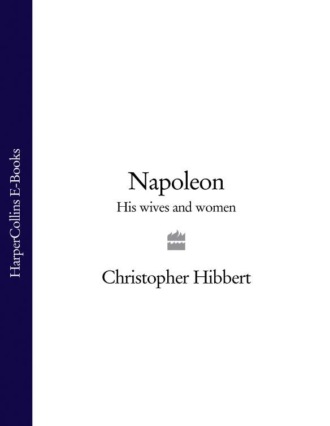
Полная версия
Napoleon: His Wives and Women
Bonaparte and I were eight years old when our friendship began…I was the only one of his youthful comrades who could accommodate themselves to his stern character…His ardent wish to acquire knowledge was remarkable even then. When he first came to the college he spoke only the Corsican dialect and the vice-principal gave him lessons in French…[He was very bad at Latin] but the facility with which he solved mathematical problems absolutely astonished me…
His conversation almost always bore the appearance of ill-humour, and he was never very amiable…His temper was not improved by the teasing he frequently experienced from the other boys who were fond of ridiculing him because of his odd Christian name and his country…He was certainly not much liked and rarely took part in the school’s amusements. During play-hours he used to withdraw to work in the library where he read with deep interest books of history. I often went off to play with my friends and left him to read by himself in the library.
One day his parents came to see him. His father, wearing a smart, new wig, was an embarrassing sight, bowing in an extravagantly polite way when he stood aside to allow the headmaster to pass first through a door. But his mother was all that a boy – a Corsican boy in an academy attended by so many French cadets from upper-class families – could hope to have. Her long dark hair was tied back in a chignon and covered by a lace headdress, and her dress was of white silk with a pattern of green flowers. She was not feeling well, however, having recently suffered from puerperal fever. She still had cause to complain of intermittent pain on her left side, an ailment which her husband hoped would be alleviated by a course of the waters at Bourbonne.
She heard with dismay that Napoleon had now set his heart on going into the navy and, as a preparation for life at sea, had taken to sleeping in a hammock in his cubicle. She anxiously pointed out the twin dangers of a life at sea: the chances of being killed on board and of being drowned if thrown into the water. When she returned to Ajaccio she asked the comte de Marbeuf to do all he could to dissuade her son from fulfilling his youthful ambition.
Letizia was also worried by the state of her husband’s health: he had lately lost much weight and had little appetite; he looked exhausted and his skin was discoloured by blotchy patches. Carlo was persuaded to go to Aix, then to Montpellier, to seek specialist advice. None of any use was given him: he died of cancer of the stomach in February 1785, a month before his thirty-ninth birthday, seized at the end, so Napoleon was later to say, with a passion for priests: ‘There were not enough for him in all Montpellier…He ended his life so pious that everyone there thought him a saint.’
Napoleon had by then left Brienne and, no longer set upon a career in the navy, had gone on to the École Militaire in Paris, an establishment which set almost as much store by religious observances as by military training: attendance at Mass was compulsory; so were confirmation and confession.
Napoleon was distressed to hear of his father’s death and worried that his mother, a widow with eight children, would find it hard to get by in her straitened circumstances. When someone offered to lend him money, he declined the offer with the words, ‘My mother has too many expenses already, I must not add to them.’
He was as proud and as priggish as ever, just as intolerant of criticism and of what he took to be slights to his amour propre, furious when he was made to feel foolish – as, for instance, when, never having seen ice before, he demanded to know who was putting glass in his water jug.
Stories were told of his throwing his musket at the head of a senior cadet who, having noticed a mistake in Napoleon’s drill, had rapped him over the knuckles, and of his rejecting the overtures of a former friend, Pierre François Laugier, son of a baron, whom he had criticized for associating with young men of homosexual tendencies. ‘Your new friends are corrupting you,’ he told Laugier. ‘So make a choice between them and me.’ Later he said, ‘You have scorned my advice, and you have renounced my friendship. Never speak to me again.’ Laugier’s response was to creep up behind him and push him over, upon which Napoleon ran after him and, grabbing him by the collar, threw him to the floor on which he hit his head against a stove.
‘I was insulted,’ Napoleon told the captain on duty who came up to admonish him. ‘I took my revenge. There is nothing more to be said.’ He then strode off in a manner which by then had become characteristic, his arms folded, his head bent forwards, taking long steps.
The sexual proclivities of Laugier induced Napoleon to write a paper to be sent to the Minister of War on the subject of the education of the young men of Sparta which, he thought, should be applied in the École Militaire and other French academies. He sent a draft to the headmaster of the school at Brienne who, having read it, advised him not to pursue the matter further.
A report on the Corsican cadet at the École Militaire described him as ‘solitary, haughty, egotistical…Reserved and studious, he prefers study to any kind of amusement…He enjoys reading good authors and has a sound knowledge of mathematics and geography…He is most proud and ambitious.’
5 A PROSTITUTE AND A PEST
‘A woman who is feared has no charm.’
NAPOLEON WAS NOW SIXTEEN YEARS OLD. His relations with women had, up till now, been largely limited to those with members of his own family and their friends; and he had had little opportunity of coming across girls of his own age. On holiday in Paris, however, he saw something of the two daughters of Panoria Permon, a Corsican of Greek descent, the attractive wife of an army contractor and the mother of two young daughters, Cécile and Laure. When Napoleon was commissioned soon after his sixteenth birthday, he called at the Permons’ house in the Place de Conti in his new officer’s uniform and long black boots which looked far too big for his painfully thin legs. The girls laughed at the sight of him; and since he was obviously put out by this unwelcome reception and seemed unable then, as always, to tolerate a joke at his own expense, Cécile told him that, now he was entitled to wear an officer’s sword, he must use it to protect the ladies and not mind if they teased him.
‘It’s obvious you’re just a little schoolgirl,’ Napoleon said grumpily.
‘What about you?’ the ten-year-old girl replied. ‘You’re just a puss-in-boots.’
In an attempt to show there was no ill feeling, however, the next time he called at the house, Napoleon brought with him a copy of Puss-in-Boots for one of the sisters and, for the other, a model which he had had made, though he could ill afford it, of Puss, running in front of the carriage of his master, the marquis de Carabas. Their mockery was not forgotten, however: for years thereafter Laure Permon was known by Napoleon as his ‘little pest’ and, a whole decade later, when she made some reference to the Puss-in-Boots episode, Laure said she would never forget Napoleon’s expression, as he came up to her to pinch her nose so hard that she cried out in pain. ‘You’re witty, you little pest,’ he said, ‘but you’re malicious. Don’t be that. A woman who is feared has no charm.’ Napoleon neither then nor later ever forgot a slight. Nor could Laure Permon ever forget the disdainful twist of his mouth when he was angry, nor yet his charm when he chose to exercise it.
Equipped with his sword and his boots, Napoleon had now to decide which regiment he should apply to join. He selected La Fère, a well-regarded artillery regiment stationed at Valence on the Rhône between Marseilles and Lyon, the nearest garrison town to Corsica.
In Valence he lived in a first-floor room in a house belonging to a fifty-year-old woman, Mme Bou. It was a small and by no means quiet room in which could clearly be heard the click of billiard balls in the room next door, the saloon of the Café Cercle. But he liked Mme Bou, who did his washing for him and mended his clothes, and life in Valence was generally pleasant enough: together with his fellow young officers he was invited to the houses of the local gentry. He rarely accepted these invitations, though, feeling he would be out of place, de trop. He found the money for a course of dancing lessons. He also scraped together the money to reimburse his mother for the postage of the clothes she sent him. He had little money to spare, however; and he would always borrow a book if he could, rather than buy one.
In the loneliness of his room, he was often desperately unhappy, even suicidal. ‘Always alone,’ he wrote, ‘in the throes of my melancholy my thoughts dwell on death…What great rage brings me now to wish for my destruction…I see no place for me in this world…As I must die sooner or later, why should I not kill myself?’
He read a great deal, mostly history and political theory, the works of Machiavelli, accounts of the religion of the Aztecs, the government of India, of ancient Rome, and books about England, being struck by the ascendancy of Parliament and the decline of the monarchy whose power and the power of whose ministers in France must, he decided, be limited. He also wrote a great deal, papers on the handling and uses of artillery, essays on Plato’s Republic, on the ancient Greeks and Persians, on modern England and ancient Greece, on Marigny’s History of the Arabs under the Caliphs. He wrote hurriedly and far into the night and was often unable to decipher what he had written in the morning.
He made précis of passages that interested him, lists of words hitherto unfamiliar to him and curious facts from books which caught his fancy – such as Jean Gaspard Lavater’s The Art of Judging Character from Men’s Faces. Having read Marigny’s History of the Arabs he noted, ‘Soliman is said to have eaten 100 pounds of meat a day…Mahomet did not know how to read or write. I find this improbable. He had 17 wives.’ From Buffon’s Histoire Naturelle he copied out, with evident fascination, long passages about castration and about testicles – ‘Some men are born with only one, others have three; these men are stronger and more vigorous.’ His interest in such matters was at this time largely academic.
At Valence, he made the acquaintance of the family of a Mme Colombier whose daughter was named Caroline; but, as he later commented, ‘It will be considered scarcely credible, perhaps: our whole business consisted of our eating cherries together.’ On a brief visit to Paris in November 1787, when he was eighteen, he encountered a young prostitute in the Palais Royal one cold evening and took her to bed; but the experience seems to have made no deep impression upon him. He recorded in detail the conversation he had with her, the questions he asked: how could she bear to walk about in the arcades in such bitter weather? Was she not exhausted by such a life as hers? Was there not some other work which would be better suited to her health? She must come from the north to brave such cold as this? How did she lose her virginity? Was she angry with the army officer who took it? How did she come to Paris?
She told him another officer had brought her there. ‘He deserted me also,’ she said. ‘Now I have a third. I have been living with him for three years. He’s French, but has business in London. He’s there now. Let’s go to your place.’
‘What will we do when we get there?’
‘We’ll get warm. Come on. You’ll have great pleasure.’
Whether he did or not Napoleon did not say. He did say, however, that ‘more than most people’, he hated prostitution and always ‘felt sullied by a look from women of that sort’, but that this young woman’s pale cheeks and soft voice ‘at once overcame [his] doubts’.
When, in June 1788, Napoleon had been posted from Valence to Auxon, he had, in order to ease the burdens imposed upon his mother, offered to have the eleven-year-old Louis, then his favourite brother, to stay with him; and he did what he could to help Letizia when, following the death of their friend Marbeuf and the establishment in Corsica of a new, stricter authority by officials of the Ministry of Finance, subsidies due to her for improvements carried out on the family’s land were withheld. He wrote letters of protest to the new authorities in Corsica; and he went to Paris to press in person his mother’s claims.
After the outbreak of revolution in Paris the following year, Napoleon warmly welcomed the decrees of the Constituent Assembly and the formulation of a new constitution. Many of his fellow-officers went abroad in apprehension or disgust; but he remained to become Secretary of the local Society of Friends of the Constitution and to take an oath ‘to die rather than allow a foreign power to invade French soil’.
He spent his leaves in Corsica. His mother, who had given birth to thirteen children, five of whom had died in infancy, was unwell, still suffering from the after-effects of puerperal fever and, occasionally, painful stiffness in her left side. He took her to Guagno for a course of the waters there; but she found them of little use. She was still a good-looking woman, though, and was always neatly dressed in her widow’s weeds. She had received two offers of marriage, but had declined them both for her children’s sake.
When Napoleon went on leave in September 1791, Joseph was by then a lawyer – twenty-three years old, and a rising figure in local government. Lucien was sixteen, Louis three years younger; Jérôme, a rather tiresome, cheeky boy, was nine. Elisa, at fourteen the oldest of the three girls, was still at school at St Cyr; her sister, Pauline, Napoleon’s favourite, was eleven, and Caroline was nine.
In caring for them their mother had the help of but one servant now, Severia, who was paid a mere pittance – all that the family could afford, since a contract entered into by Carlo with the French government for a plantation of ten thousand mulberry trees for the manufacture of silk had been cancelled.
Carlo’s old uncle, Luciano, the Archdeacon, who now spent most of his time in bed nursing his gout, was known to have concealed in his mattress a large bag of gold, the profits from a number of most un-archdiaconal dealings in land, farm animals and wine; but he was unwilling to part with a single coin. An attempt by the beguiling Pauline, who was sent to his room to see if she could lay her hands on one or two while his attention was distracted, ended in rowdy failure when the whole bag tumbled to the floor. Alarmed by the old man’s cries, Letizia rushed downstairs to see what had happened. Uncle Luciano informed her that he was only looking after the gold for a friend. Letizia picked up the coins and handed them to him. He counted them carefully before replacing them in the bag and stuffing the bag back into the mattress.
The old man now had but a short time to enjoy whatever comfort his hoard of gold could give him. In the hope of bringing him some relief from his gout and his other ailments, Napoleon, who still had a lingering affection for him, wrote to a Swiss doctor, Simon Tissot, for his advice. But Tissot, who had written a number of eccentric though celebrated books – in one of which he propounded the view that masturbation led inevitably to insanity – was not prepared to help. He endorsed the letter as of ‘little interest’ and did not trouble to send a reply.
Soon afterwards, Uncle Luciano died, leaving his gold to his nephew’s sons and enabling Napoleon to take part in the expensive business of Corsican politics and to ensure his election to the command of a battalion in the Corsican National Guard at the age of twenty-two.
Back in Paris, he was a witness of the growing violence of the Revolution, of the attack on the Tuileries and the events which led to the prison massacres of 7 September 1792. Three weeks before the massacres, his sister Elisa’s convent at St Cyr was closed and Napoleon, concerned for the fifteen-year-old girl’s safety, went to fetch her, bringing her back to Paris in her black school uniform and feathered taffeta bonnet.
Elisa had left home soon after her eighth birthday and had received a rigorous education at the school which had been founded by Louis XIV’s mistress, Mme de Maintenon. Horace Walpole had seen the girls there marching off to chapel two by two in a most orderly fashion, ‘each band headed by a nun…to sing the whole service’. There were no signs then of the self-confident woman Elisa was later to become. On a previous visit, when Napoleon had visited the school with Mme Permon, Elisa had come into the room looking miserable and had burst into tears. When asked what the trouble was, she had said that she had no money to contribute to a farewell party which was being given for one of the other girls. Mme Permon gave her some.
Promoted captain by now, Napoleon took her to the opera, an entertainment which the nuns at St Cyr had warned her to avoid as an indecent spectacle. Her brother noticed that, obedient to their admonitions, she sat at first with her eyes tight shut; but, shortly, unable to resist its allure, she sat in rapt attention.
At Marseilles on her way back to Corsica, her uniform with the cross and fleurs de lys embroidered on the front of the black dress caught the attention of a threatening crowd who, pointing to this and her feathered bonnet, cried, ‘Death to the aristocrats!’ ‘We’re no more aristocrats than you are,’ Napoleon shouted back at them and, snatching the bonnet from his sister’s head, he threw it to them. One of them caught it and they all cheered.
Back once more in Corsica, Napoleon – whom, so his brother Lucien said, no one now cared to oppose – was at loggerheads with the autocratic Paoli, who, having returned to Corsica, was intent upon separating Corsica from revolutionary France with which the Buonapartes were now identified. Napoleon, having decided to make an attempt to seize Ajaccio for France, sent a message to his mother telling her to take the family to a ruined tower at Capitello, east of the gulf of Ajaccio, and to remain there during the forthcoming bombardment of the town. Concerned that they might not be safe at Capitello, he followed them there in a small boat and sent them on to Calvi, a town which was held by the French.
Having failed to take Ajaccio, he joined them at Calvi and with them set sail for Toulon. The family’s house was pillaged by the Paolists, and their farmhouses sacked and their mill dismantled. A Paolist congress condemned the Buonapartes to ‘perpetual execration and infamy’.
Letizia was not happy living first in Toulon, then in primitive lodgings in the village of La Valette, afterwards in Bandol and later in Marseilles, where the family’s gloomy, ill-furnished fourth-floor rooms were in the rue Pavillon, a poor district little better than a slum. However, before long, thanks to Cristoforo Saliceti, a fellow-Corsican, a more comfortable house had been found for them, as well as a post as storekeeper for Lucien and an appointment as assistant to a war commissary for Joseph, while Napoleon continued to do well in the army.
But Letizia missed her homeland. Her halting French, spoken with a strong Corsican accent, was scarcely comprehensible; while malicious stories were already being spread about her daughters who, so it was later alleged, were behaving in a scandalous manner, ‘walking the streets in the evening like certain young women who frequent the rue St Honoré and the Palais Royal’.
Even when Napoleon, once he was in a position to help his family financially, had rented the Sallé château, a large country house near Antibes, for them, Letizia still behaved in a Corsican manner, and still insisted on doing her own washing. After all, as she, the most thrifty of women, was often to say in the future, who knew how long the family’s present fortune would last?
Her daughters had no such apprehension as they bowled along the country lanes in a barouche provided for them by their brother, Napoleon, who by then was earning fifteen thousand livres a year.
6 THE ‘ADORABLE FRIEND’
‘How could you think I could cease to love you?’
DEPRESSED AS NAPOLEON HAD BEEN in Valence and frustrated as he had been while in Corsica, soon after his return to France he had begun to make a name for himself in the army. When his superior officer had been wounded during the siege of Toulon in 1793, Napoleon had been given command of the artillery there and, having handled it with exemplary skill, he had been promoted to général-de-brigade at the age of twenty-four. He had since been employed in preparing plans for the operations of the army which the government in Paris had sent against the Austrians in Italy; and, in October 1795, he had helped to defeat supporters of a counter-revolution in Paris by ordering his guns to fire upon the mob – the mob he always hated and feared – his famous ‘whiff of grapeshot’. ‘The enemy attacked us at the Tuileries,’ he had reported to his brother, Joseph. ‘We killed a great many of them. They killed thirty of our men and wounded another sixty. Now all is quiet. As usual I did not receive a scratch. I could not be happier.’ Four hundred men lay dead in the church of St-Roch; and Napoleon’s future was made. ‘I have lodgings and a carriage at your disposal,’ he told Joseph. ‘I have already sent sixty thousand livres in gold, silver and paper money to the family, so you need have no worries…You know I live only for the pleasure of what I can do for the family.’
Not long afterwards, he was appointed to the command of the Army of the Interior. For this rapid change in his fortunes he was much indebted to the support and patronage of the vicomte Paul de Barras, who had been entrusted with dictatorial powers by the National Convention.
Napoleon was now in a position to marry, and he turned his thoughts seriously to the choice of a bride, preferably a rich one. According to Barras, who wrote long after their friendship had been broken, he was not above dancing attendance, in a most uncharacteristic manner, on wealthy women who, or whose husbands, he thought might be in a position to advance him in his career. One such was the wife of a man of some influence – Mme Louise Turreau de Lignières, with whom, it was improbably suggested, he conducted a brief affair. Another was Mme Ricord upon whom ‘he heaped attentions, handing her her gloves and fan and showing her the deepest respect when she mounted her horse, taking her for walks hat in hand, and appearing to be in constant terror lest she should meet with some accident’.
It was Barras who introduced him to another rich woman, Mme Montausier, a woman who was said to be worth over a million francs and who owned a theatre which was also a brothel in the Palais Royal. She was very much older than Napoleon: this in itself did not much concern him; but for one reason or another the relationship did not prosper.
It was not only money and position he was after, as he told his brother Joseph; he ‘badly wanted a home’; and if he could find a young woman with a handsome dowry, of course so much the better. In the summer of 1794, while occupying lodgings in the house of the comte de Laurenti near Nice, he thought that he might have found such a bride in the person of the count’s sixteen-year-old daughter Emilie whose father, he had good reason to believe, was quite rich. He asked him, evidently without much hope of success, if he might marry Emilie. Her father, polite in his refusal, considered the proposal premature: the young general was about to embark on a campaign in Italy; there would be time enough to consider the matter when his daughter was older and Bonaparte had returned home. In the meantime, the count and his wife thought it as well to send Emilie to stay with cousins at Grasse.
Later on that year in Marseilles, Napoleon was introduced by his brother Joseph to the family of the rich textile-and-soap merchant, François Clary (the husband of one of their mother’s friends), who had two daughters, Julie, aged twenty-two, whom Joseph was to marry, and Bernardine Eugénie Désirée, aged sixteen. Julie was a plain young woman with big bulging eyes and a thick flat nose. Short and spotty, she was described in later life as ‘a perfectly vulgar little woman, very thin and very ugly’, ‘hideous’ even and ‘pimply to the last degree’.






